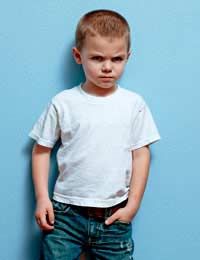The Effects of Punishment on Children

Punishment is anything that reduces the frequency of unwanted behaviours. In theory, punishment should suppress inappropriate behaviours totally, but this is rarely the actual result. Parents must remember that punishment, particularly corporal punishment, is distinct from discipline. Disciplining children is almost always preferable to simply punishing children as children are still learning and growing and deserve to be taught how to do better and be better.
Corporal Punishment
Corporal punishment is the infliction of physical pain on someone convicted of wrongdoing. Most parents who use corporal punishment do so in the form of smacking or spanking a child. Some parents also slap their children’s arms, hands or legs. Very rarely do parents choose to use corporal punishment in any other form, and today there is only a very thin line between what is accepted as corporal punishment and what is considered child abuse. For example, in the past some children were punished with belts or straps. Today these actions are entirely inappropriate and rightly condemned.Parents who do engage in corporal punishment believe that they are teaching their children an almost Pavlovian response – that misbehaviour brings pain and should be avoided. Parents who do not use corporal punishment argue that it does nothing to teach self-discipline or responsibility but that it does convey the message that harming or hurting others is acceptable. Several academic studies have also found a link between corporal punishment and childhood aggression and antisocial behaviour.
Punishment versus Discipline
Whether corporal or not, punishment simply teaches children that if they break rules they will suffer negative consequences. Punishment does not necessarily teach children why the rules are in place, why the rules are important or how they can act in accordance of the rules. Punishment also does not teach children to be responsible or to take into account the thoughts, needs or experiences of others. Discipline, on the other hand, always carries a lesson which helps children to understand what appropriate behaviours are and why they have become accepted in our society. Disciplining children is really a means of teaching children how to better themselves.The Effects of Punishment
Unfortunately, punishment is only effective at deterring inappropriate behaviours in so far as it provokes fear in children. Children come to fear for their possessions (that they may be taken away), privileges (that they may be revoked), preferences (that they may be used against them) and even safety and well being (if they are routinely caused pain or harm in the name of punishment). Children do not necessarily come to understand why their behaviour was wrong, or how their behaviour negatively impacted others. In contrast, the effects of discipline on children are often an increased sense of responsibility, self-confidence and the ability to distinguish appropriate from inappropriate behaviours.Punishment, or the deliberate infliction of unpleasantness on someone judged to have done wrong, may be very tempting to some parents. In the heat of the moment it is very easy to fall into the trap of making a child feel bad in response to their own bad behaviour. However, punishment does not teach a child anything other than that it is alright to hurt others. Instead, parents should strive to discipline their children in order to help them better themselves and their situations. Properly disciplined children will grow to be happy, healthy and productive members of not just the family, but society as well.
- B.F. Skinner's Behavioural Theory
- 'The Naughty Step' as a Discipline Technique
- 'Time Out' as a Discipline Technique
- Discipline Outside The Home
- Disciplining Children
- Disciplining Young Children
- Chores for Children
- Behavioural Disorders in Children
- Common Behavioural Problems in Children
- Reinforcing Good Behaviour
- Rewarding Good Behaviour
- Child Temper Tantrums
- The 'Terrible Twos'


Re: Child Temper Tantrums
I work with 2-3 year olds and I find it useful to validate their feelings. For example, "I know you are very upset right now and you want…
Re: Speech Therapy for Children
Dear Speech Therapy Clinic, I am writing to inquire about speech therapy services for my 3-year-old son. I have noticed that he…
Re: Child Temper Tantrums
I often use my book center for a calm down center. It is not a punishment but a place to take a break and calm down quietly
Re: Mahler's Theory of Development
I'm learning a lot about the end theories .
Re: Child Temper Tantrums
As an assistant director, I get brought kids who the teachers are struggling with to help calm them down. I bring them into my office, we…
Re: Brain Development in Young Children
Hi I have a son. He is 2 and half years old and he is diagnosed with autism. He doesn’t respond to his name and appears…
Re: Child Temper Tantrums
i think once you start to learn the child handling their behavior is easier. it takes time but patience is a virtue!
Re: Erikson's Theory of Psychosocial Development
No, children develop in their own pace for example, a 1-year-old would develop to hold a pencil and another…
Re: Extra Tutoring: How Do I Pay?
i am looking to help out students with private tuition as their parents cant afford it i would like to apply for grants or…
Re: The 'Terrible Twos'
child throws temper tantrum when its cleanup time even when singing the cleanup song, hits my hand and starts pulling the toys back out of the…